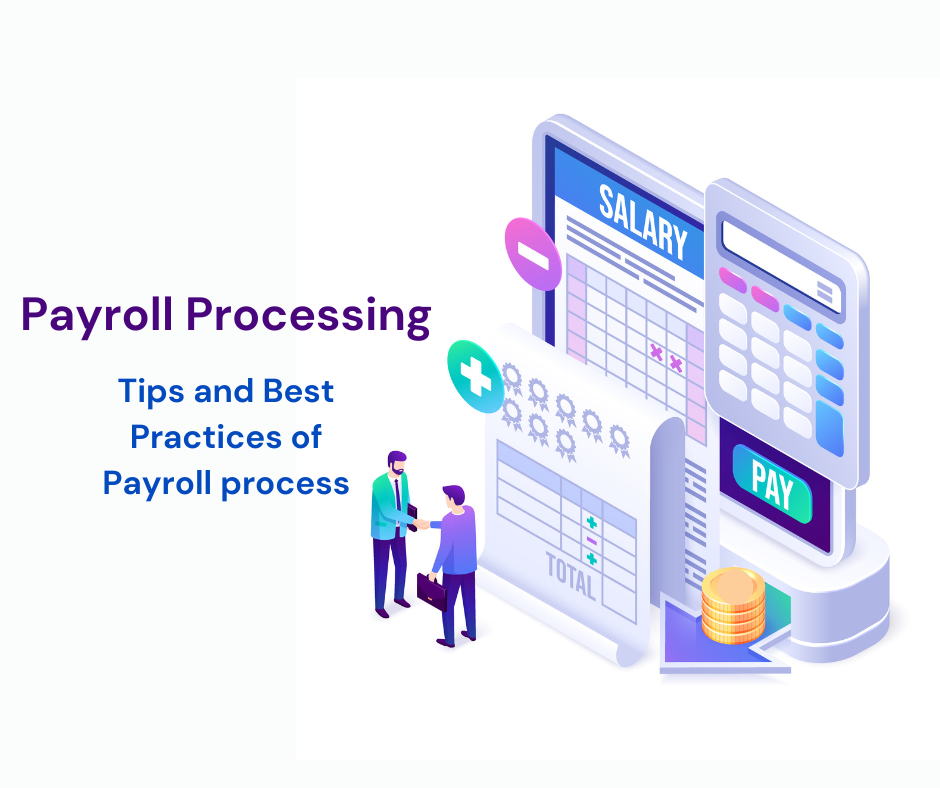What is payroll? In simple terms, Payroll is an end-to-end process wherein the company calculates the employees’ salaries. It lines up the with the employees’ payroll cycle list to be paid, trace of hours worked, calculates the employee’s pay, and ends with recording the payroll expense after adjusting the required deductions like employees’ PF contribution, TDS and meal coupons, etc.
The payroll process refers to the set of activities and procedures that an organization follows to calculate, manage, and distribute employee compensation, including salaries, wages, bonuses, and deductions. It’s a critical aspect of a company’s human resources and finance management. The payroll process ensures that employees are accurately and timely paid for the work they have performed.
The core objective of payroll processing is to make sure that there are no discrepancies and that the employee is paid impartially every month.
This may sound like a straightforward task, but there are many stages involved. The final salary includes countless additions and deductions such as taxes, insurance, provident fund, gratuity, and others. In this, we will discuss about payroll management from start to end for effective processing.
Read more: (Core components of payroll processing in India)
Things to keep in mind while processing payroll:
Stages of Payroll:
Pre-payroll phase:
- Setting up the organization
- Collecting the payroll input
- Validating the input
Payroll calculation phase:
Computing pay slips
Post-payroll phase:
- Pay slip and tax sheet distribution
- Salary payments
- Payroll accounting
- Payroll reporting and statutory compliance
What is payroll processing?
Payroll processing refers to the systematic and administrative task of calculating and disbursing employee compensation, including salaries, wages, bonuses, and deductions. It is a critical function within an organization that ensures employees are paid accurately and on time, while also complying with legal and regulatory requirements. The payroll process involves several steps, which may vary depending on the organization’s size, industry, and location. Here are the key components of the payroll processing cycle:
- Data Collection: Gathering accurate and up-to-date employee data, such as work hours, overtime, vacation days taken, tax withholdings, and other deductions.
- Time Tracking: Recording and tracking the number of hours worked by employees, including regular hours, overtime, and any special pay rates.
- Calculation of Gross Pay: Calculating the total compensation owed to employees, including their regular wages, overtime pay, and any additional payments or bonuses.
- Deductions: Subtracting various deductions from employees’ gross pay, such as taxes (state, and local), Social Security contributions, retirement plan contributions, healthcare premiums, and other authorized deductions.
- Benefits and Deductions: Processing employee benefits such as retirement contributions, health insurance premiums, and other voluntary deductions.
- Reporting and Compliance: Compiling and submitting required payroll reports to government agencies, including tax forms and reports related to Social Security, Medicare, and unemployment insurance.
- Reconciliation: Regularly comparing payroll records to financial records to ensure accuracy and consistency.
Effective payroll processing not only ensures that employees are fairly compensated but also helps businesses remain compliant with labor laws and tax regulations. As businesses grow and evolve, many organizations opt to use payroll software or outsource their payroll functions to specialized providers to streamline the process and minimize errors.
Read more: (5 Important Reasons to Outsource Your Payroll Processing)
Streamlining payroll processing is a multifaceted endeavour that requires careful planning, effective software, and a commitment to accuracy and compliance. By centralizing data, embracing automation, and utilizing the right technology, businesses can simplify their payroll processes, reduce errors, and ultimately save time and resources. Whether you’re a small startup or a large corporation, optimizing your payroll process will contribute to a more efficient and productive work environment.
Navigating the Payroll Process: From Punch-In to Payout:
A well-executed payroll process ensures that employees are compensated accurately and on time, fostering employee satisfaction and organizational stability. However, behind every smoothly deposited payslip lies a complex system of calculations, regulations, and technological innovations that make up the payroll process.
Gathering Employee Information
Before the gears of the payroll machine can start turning, a business needs to collect and maintain accurate records of its employees. This information typically includes employee names, addresses, salary or hourly wage rates, and any benefits or deductions they are entitled to. This data forms the foundation upon which the rest of the payroll process is built.
Tracking Employee Work Hours
For businesses that pay their employees hourly, tracking work hours accurately is crucial. This process involves monitoring attendance, breaks, overtime, and any special circumstances that might affect an employee’s pay. The advent of digital time-tracking systems has streamlined this aspect, reducing errors and manual labour.
Calculating Gross Pay
Once the hours are tallied, it’s time to calculate the gross pay. For salaried employees, this can be relatively straightforward. However, for hourly workers, calculations might include regular hours, overtime, double time, and even shift differentials. Ensuring compliance with labour laws and company policies is essential in this step to avoid errors and potential legal issues.
Deductions and Taxes
From gross pay, various deductions are subtracted, including state taxes, health insurance premiums, retirement fund contributions, and more. This stage demands a deep understanding of tax laws, as mistakes can result in financial penalties and disgruntled employees.
Wrap-up:
Efficient HR payroll management is crucial for businesses to handle employee compensation and associated responsibilities. TalentPro, an HR outsourcing firm, offers a range of HR management solutions, encompassing the effective administration of payroll among other services.











